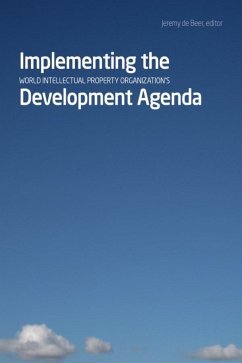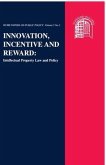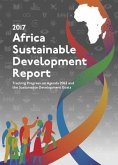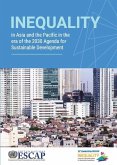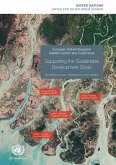Implementing the World Intellectual Property Organizationas Development Agenda
Herausgeber: De Beer, Jeremy
Implementing the World Intellectual Property Organizationas Development Agenda
Herausgeber: De Beer, Jeremy
- Broschiertes Buch
- Merkliste
- Auf die Merkliste
- Bewerten Bewerten
- Teilen
- Produkt teilen
- Produkterinnerung
- Produkterinnerung
The newly adopted World Intellectual Property Organization (WIPO) Development Agenda presents a real opportunity to revolutionize the international governance of intellectual property law and policy. The litmus test for its success, however, will be if and how the agenda is implemented in practice. This edited collection brings together a series of incisive essays written by leading thinkers from emerging economies, Canada, and elsewhere to develop concrete strategies for implementing the agenda. The essays cover a range of fundamental issues surrounding the agenda and examine its…mehr
Andere Kunden interessierten sich auch für
![Managing University Intellectual Property in the Public Interest Managing University Intellectual Property in the Public Interest]() National Research CouncilManaging University Intellectual Property in the Public Interest46,99 €
National Research CouncilManaging University Intellectual Property in the Public Interest46,99 €![Patents and Public Health Patents and Public Health]() Matthew HowardPatents and Public Health8,49 €
Matthew HowardPatents and Public Health8,49 €![Antiturst Enfrocement and Intellectual Property Rights: Promoting Innovation and Competition Antiturst Enfrocement and Intellectual Property Rights: Promoting Innovation and Competition]() U S Department of Justice and the FeAntiturst Enfrocement and Intellectual Property Rights: Promoting Innovation and Competition22,99 €
U S Department of Justice and the FeAntiturst Enfrocement and Intellectual Property Rights: Promoting Innovation and Competition22,99 €![Innovation, Incentive and Reward: Intellectual Property Law and Policy Innovation, Incentive and Reward: Intellectual Property Law and Policy]() Hector MacqueenInnovation, Incentive and Reward: Intellectual Property Law and Policy40,99 €
Hector MacqueenInnovation, Incentive and Reward: Intellectual Property Law and Policy40,99 €![Africa Sustainable Development Report 2017 Africa Sustainable Development Report 2017]() Africa Sustainable Development Report 201734,99 €
Africa Sustainable Development Report 201734,99 €![Inequality in Asia and the Pacific in the Era of the 2030 Agenda for Sustainable Development Inequality in Asia and the Pacific in the Era of the 2030 Agenda for Sustainable Development]() Inequality in Asia and the Pacific in the Era of the 2030 Agenda for Sustainable Development39,99 €
Inequality in Asia and the Pacific in the Era of the 2030 Agenda for Sustainable Development39,99 €![European Global Navigation Satellite System and Copernicus European Global Navigation Satellite System and Copernicus]() European Global Navigation Satellite System and Copernicus45,99 €
European Global Navigation Satellite System and Copernicus45,99 €-
-
-
The newly adopted World Intellectual Property Organization (WIPO) Development Agenda presents a real opportunity to revolutionize the international governance of intellectual property law and policy. The litmus test for its success, however, will be if and how the agenda is implemented in practice. This edited collection brings together a series of incisive essays written by leading thinkers from emerging economies, Canada, and elsewhere to develop concrete strategies for implementing the agenda. The essays cover a range of fundamental issues surrounding the agenda and examine its recommendations from multidisciplinary and multi-regional perspectives. Several essays explore the role of WIPO and its member states in steering the direction of future reform as well as potential approaches to achieve this goal. Other contributions examine specific recommendations on WIPO's activities within the broader context of development. This volume will be a useful source of reference for informed but non-expert readers, including government officials and delegates at international and "capital" levels, leaders of the international business community, individuals in inter- and non-governmental organizations, and scholars in the fields of law and international governance. Co-published with the International Development Research Centre and the Centre for International Governance Innovation
Produktdetails
- Produktdetails
- Verlag: Wilfrid Laurier University Press
- Seitenzahl: 204
- Erscheinungstermin: 24. April 2009
- Englisch
- Abmessung: 230mm x 154mm x 14mm
- Gewicht: 302g
- ISBN-13: 9781554581542
- ISBN-10: 1554581540
- Artikelnr.: 26156414
- Verlag: Wilfrid Laurier University Press
- Seitenzahl: 204
- Erscheinungstermin: 24. April 2009
- Englisch
- Abmessung: 230mm x 154mm x 14mm
- Gewicht: 302g
- ISBN-13: 9781554581542
- ISBN-10: 1554581540
- Artikelnr.: 26156414
Table of Contents for
Implementing the World Intellectual Property Organization's Development
Agenda, edited by Jeremy de Beer
List of Acronyms
Foreword Daniel J. Gervais
Acknowledgements
Defining WIPO's Development Agenda Jeremy de Beer, University of Ottawa,
ON
The WIPO Development Agenda Forum and Its Prospects for Taking into Account
Different Levels of Development Sara Bannerman, Carleton University,
Ottawa, ON
A Conceptual and Methodological Framework for Impact Assessment under the
WIPO Development Agenda (Cluster D) Xuan Li, Innovation & A2K Programme,
South Centre, Geneva
Reforming Governance to Advance the WIPO Development Agenda Carolyn
Deere, Global Trade Governance Programme, University of Oxford, UK
From Agenda to Implementation: Working Outside the WIPO Box E. Richard
Gold and Jean-Frédric Morin, Centre for IP Policy, McGill University,
Montréal, QC
The Role of WIPO's Leadership in the Implementation of the WIPO Development
Agenda Sisule F. Musungu, Information Society Project, Yale University,
New Haven, CT
Building Intellectual Property Coalitions for Development Peter K. Yu,
Intellectual Property Centre, Drake University, Des Moines, IA
The WIPO Development Agenda: Factoring in the "Technologically Proficient"
Developing Countries Shamnad Basheer, Oxford IP Research Centre,
University of Oxford, UK and Annalisa Primi, UN Economic Commission for
Latin America and the Caribbean, Santiago, Chile
Localizing WIPO's Legislative Assistance: Lessons from Chinas Experience
with TRIPs Lihong Li, University of Ottawa, ON
The Public-Private Dichotomy of IP: Recommendations for the WIPO
Development Agenda V.C. Vivekanandan, NALSAR University of Law,
Hyderabad, India
Strategies to Implement the WIPO Development Agenda: A Brazilian
Perspective and Beyond Pedro Paranaguá, Fundação Getulio Vargas, Rio de
Janeiro, Brazil
Implementing the WIPO Development Agenda: Treaty Provisions on Minimum
Exceptions and Limitations for Education Andrew Rens, Shuttleworth
Foundation, South Africa
Afterword Christopher May
Contributors
Index
Contributors' Bios
Sara Bannerman is a part-time professor at the University of Ottawa. Her
research focuses on Canadian and international copyright history.
Shamnad Basheer is the Ministry of HRD Chair in Intellectual Property at
the National University of Juridical Sciences (NUJS), Kolkata, India.
Jeremy de Beer is an associate professor in the Faculty of Law at the
University of Ottawa.
Carolyn Deere is the director of the Global Trade Governance Project at the
Global Economic Governance Programme, University College, Oxford.
Daniel Gervais is professor of law, Vanderbilt University Law School and
University of Ottawa (Common Law Section). He is the autor of The TRIPS
Agreement: Drafting History and Analysis (3rd ed., 2008), editor of
Intellectual Property, Trade and Development (Oxford University Press,
2007) and of Collective Management of Copyright and Related Rights
(Kluwer, 2006), and co-author of Intellectual Property: The Law in Canada
(Carswell, 2005).
E. Richard Gold is president of The Innovation Partnership,
http://www.theinnovationpartnership.org, and associate professor, Faculty
of Law, at McGill University.
Lihong Li is an LL.D. candidate in the Faculty of Law at the University of
Ottawa.
Xuan Li is coordinator of the Innovation and Access to Knowledge Programme
at the South Centre, Geneva, Switzerland. She is director of the
Intellectual Property Policy and Develoment online course jointly organized
by the South Centre and United Nations Institute for Training and Research.
Christopher May is professor of political economy and an associate dean of
the Faculty of Arts and Social Sciences. He has published widely on IPRs,
including the first independent book-length analysis of WIPO (Global
Institutions series, Routledge, 2007) and the revised second edition of his
influential study A Global Political Economy of IPRs (Routledge, 2009).
Jean-Frédéric Morin is assistant professor, Department of Political
Science, Université Libre de Bruxelles, and is an expert at The Innovation
Partnership.
Sisule F. Musungu is the president of IQsensato, http://www.iqsensato.org,
an international development research and policy think tank, and researcher
and policy analyst on intellectual property.
Pedro Paranaguá is full-time lecturer of law at the Fundação Getulio
Vargas's (FGV) School of Law in Rio de Janeiro. He coordinates the A2K
(Access to Knowledge) Brasil Programme, http://www.a2kbrasil.org.br/ENG, at
the Centre for Technology and Society.
Annalisa Primi is an expert, Industrial and Technological Development Unit,
with the Economic Commission for Latin America and the Caribbean, United
Nations, and is based in Santiago, Chile.
Andrew Rens is an intellectual property fellow with the Shuttleworth
Foundation in South Africa.
V.C. Vivekanandan is the Ministry of Human Resources Development
Intellectual Property Chair at NALSAR University of Law in Hyderabad,
India. The author can be reached at Vivekvc2001@yahoo.co.in.
Peter K. Yu holds the Kern Family Chair in Intellectual Property Law and is
the founding director of the Intellectual Property Law Center at Drake
University Law School. He is also a Wenlan Scholar Chair Professor at
Zhongnan University of Economics and Law in Wuhan, China, and visiting
professor of law in the Faculty of Law at the University of Hong Kong.
Implementing the World Intellectual Property Organization's Development
Agenda, edited by Jeremy de Beer
List of Acronyms
Foreword Daniel J. Gervais
Acknowledgements
Defining WIPO's Development Agenda Jeremy de Beer, University of Ottawa,
ON
The WIPO Development Agenda Forum and Its Prospects for Taking into Account
Different Levels of Development Sara Bannerman, Carleton University,
Ottawa, ON
A Conceptual and Methodological Framework for Impact Assessment under the
WIPO Development Agenda (Cluster D) Xuan Li, Innovation & A2K Programme,
South Centre, Geneva
Reforming Governance to Advance the WIPO Development Agenda Carolyn
Deere, Global Trade Governance Programme, University of Oxford, UK
From Agenda to Implementation: Working Outside the WIPO Box E. Richard
Gold and Jean-Frédric Morin, Centre for IP Policy, McGill University,
Montréal, QC
The Role of WIPO's Leadership in the Implementation of the WIPO Development
Agenda Sisule F. Musungu, Information Society Project, Yale University,
New Haven, CT
Building Intellectual Property Coalitions for Development Peter K. Yu,
Intellectual Property Centre, Drake University, Des Moines, IA
The WIPO Development Agenda: Factoring in the "Technologically Proficient"
Developing Countries Shamnad Basheer, Oxford IP Research Centre,
University of Oxford, UK and Annalisa Primi, UN Economic Commission for
Latin America and the Caribbean, Santiago, Chile
Localizing WIPO's Legislative Assistance: Lessons from Chinas Experience
with TRIPs Lihong Li, University of Ottawa, ON
The Public-Private Dichotomy of IP: Recommendations for the WIPO
Development Agenda V.C. Vivekanandan, NALSAR University of Law,
Hyderabad, India
Strategies to Implement the WIPO Development Agenda: A Brazilian
Perspective and Beyond Pedro Paranaguá, Fundação Getulio Vargas, Rio de
Janeiro, Brazil
Implementing the WIPO Development Agenda: Treaty Provisions on Minimum
Exceptions and Limitations for Education Andrew Rens, Shuttleworth
Foundation, South Africa
Afterword Christopher May
Contributors
Index
Contributors' Bios
Sara Bannerman is a part-time professor at the University of Ottawa. Her
research focuses on Canadian and international copyright history.
Shamnad Basheer is the Ministry of HRD Chair in Intellectual Property at
the National University of Juridical Sciences (NUJS), Kolkata, India.
Jeremy de Beer is an associate professor in the Faculty of Law at the
University of Ottawa.
Carolyn Deere is the director of the Global Trade Governance Project at the
Global Economic Governance Programme, University College, Oxford.
Daniel Gervais is professor of law, Vanderbilt University Law School and
University of Ottawa (Common Law Section). He is the autor of The TRIPS
Agreement: Drafting History and Analysis (3rd ed., 2008), editor of
Intellectual Property, Trade and Development (Oxford University Press,
2007) and of Collective Management of Copyright and Related Rights
(Kluwer, 2006), and co-author of Intellectual Property: The Law in Canada
(Carswell, 2005).
E. Richard Gold is president of The Innovation Partnership,
http://www.theinnovationpartnership.org, and associate professor, Faculty
of Law, at McGill University.
Lihong Li is an LL.D. candidate in the Faculty of Law at the University of
Ottawa.
Xuan Li is coordinator of the Innovation and Access to Knowledge Programme
at the South Centre, Geneva, Switzerland. She is director of the
Intellectual Property Policy and Develoment online course jointly organized
by the South Centre and United Nations Institute for Training and Research.
Christopher May is professor of political economy and an associate dean of
the Faculty of Arts and Social Sciences. He has published widely on IPRs,
including the first independent book-length analysis of WIPO (Global
Institutions series, Routledge, 2007) and the revised second edition of his
influential study A Global Political Economy of IPRs (Routledge, 2009).
Jean-Frédéric Morin is assistant professor, Department of Political
Science, Université Libre de Bruxelles, and is an expert at The Innovation
Partnership.
Sisule F. Musungu is the president of IQsensato, http://www.iqsensato.org,
an international development research and policy think tank, and researcher
and policy analyst on intellectual property.
Pedro Paranaguá is full-time lecturer of law at the Fundação Getulio
Vargas's (FGV) School of Law in Rio de Janeiro. He coordinates the A2K
(Access to Knowledge) Brasil Programme, http://www.a2kbrasil.org.br/ENG, at
the Centre for Technology and Society.
Annalisa Primi is an expert, Industrial and Technological Development Unit,
with the Economic Commission for Latin America and the Caribbean, United
Nations, and is based in Santiago, Chile.
Andrew Rens is an intellectual property fellow with the Shuttleworth
Foundation in South Africa.
V.C. Vivekanandan is the Ministry of Human Resources Development
Intellectual Property Chair at NALSAR University of Law in Hyderabad,
India. The author can be reached at Vivekvc2001@yahoo.co.in.
Peter K. Yu holds the Kern Family Chair in Intellectual Property Law and is
the founding director of the Intellectual Property Law Center at Drake
University Law School. He is also a Wenlan Scholar Chair Professor at
Zhongnan University of Economics and Law in Wuhan, China, and visiting
professor of law in the Faculty of Law at the University of Hong Kong.
Table of Contents for
Implementing the World Intellectual Property Organization's Development
Agenda, edited by Jeremy de Beer
List of Acronyms
Foreword Daniel J. Gervais
Acknowledgements
Defining WIPO's Development Agenda Jeremy de Beer, University of Ottawa,
ON
The WIPO Development Agenda Forum and Its Prospects for Taking into Account
Different Levels of Development Sara Bannerman, Carleton University,
Ottawa, ON
A Conceptual and Methodological Framework for Impact Assessment under the
WIPO Development Agenda (Cluster D) Xuan Li, Innovation & A2K Programme,
South Centre, Geneva
Reforming Governance to Advance the WIPO Development Agenda Carolyn
Deere, Global Trade Governance Programme, University of Oxford, UK
From Agenda to Implementation: Working Outside the WIPO Box E. Richard
Gold and Jean-Frédric Morin, Centre for IP Policy, McGill University,
Montréal, QC
The Role of WIPO's Leadership in the Implementation of the WIPO Development
Agenda Sisule F. Musungu, Information Society Project, Yale University,
New Haven, CT
Building Intellectual Property Coalitions for Development Peter K. Yu,
Intellectual Property Centre, Drake University, Des Moines, IA
The WIPO Development Agenda: Factoring in the "Technologically Proficient"
Developing Countries Shamnad Basheer, Oxford IP Research Centre,
University of Oxford, UK and Annalisa Primi, UN Economic Commission for
Latin America and the Caribbean, Santiago, Chile
Localizing WIPO's Legislative Assistance: Lessons from Chinas Experience
with TRIPs Lihong Li, University of Ottawa, ON
The Public-Private Dichotomy of IP: Recommendations for the WIPO
Development Agenda V.C. Vivekanandan, NALSAR University of Law,
Hyderabad, India
Strategies to Implement the WIPO Development Agenda: A Brazilian
Perspective and Beyond Pedro Paranaguá, Fundação Getulio Vargas, Rio de
Janeiro, Brazil
Implementing the WIPO Development Agenda: Treaty Provisions on Minimum
Exceptions and Limitations for Education Andrew Rens, Shuttleworth
Foundation, South Africa
Afterword Christopher May
Contributors
Index
Contributors' Bios
Sara Bannerman is a part-time professor at the University of Ottawa. Her
research focuses on Canadian and international copyright history.
Shamnad Basheer is the Ministry of HRD Chair in Intellectual Property at
the National University of Juridical Sciences (NUJS), Kolkata, India.
Jeremy de Beer is an associate professor in the Faculty of Law at the
University of Ottawa.
Carolyn Deere is the director of the Global Trade Governance Project at the
Global Economic Governance Programme, University College, Oxford.
Daniel Gervais is professor of law, Vanderbilt University Law School and
University of Ottawa (Common Law Section). He is the autor of The TRIPS
Agreement: Drafting History and Analysis (3rd ed., 2008), editor of
Intellectual Property, Trade and Development (Oxford University Press,
2007) and of Collective Management of Copyright and Related Rights
(Kluwer, 2006), and co-author of Intellectual Property: The Law in Canada
(Carswell, 2005).
E. Richard Gold is president of The Innovation Partnership,
http://www.theinnovationpartnership.org, and associate professor, Faculty
of Law, at McGill University.
Lihong Li is an LL.D. candidate in the Faculty of Law at the University of
Ottawa.
Xuan Li is coordinator of the Innovation and Access to Knowledge Programme
at the South Centre, Geneva, Switzerland. She is director of the
Intellectual Property Policy and Develoment online course jointly organized
by the South Centre and United Nations Institute for Training and Research.
Christopher May is professor of political economy and an associate dean of
the Faculty of Arts and Social Sciences. He has published widely on IPRs,
including the first independent book-length analysis of WIPO (Global
Institutions series, Routledge, 2007) and the revised second edition of his
influential study A Global Political Economy of IPRs (Routledge, 2009).
Jean-Frédéric Morin is assistant professor, Department of Political
Science, Université Libre de Bruxelles, and is an expert at The Innovation
Partnership.
Sisule F. Musungu is the president of IQsensato, http://www.iqsensato.org,
an international development research and policy think tank, and researcher
and policy analyst on intellectual property.
Pedro Paranaguá is full-time lecturer of law at the Fundação Getulio
Vargas's (FGV) School of Law in Rio de Janeiro. He coordinates the A2K
(Access to Knowledge) Brasil Programme, http://www.a2kbrasil.org.br/ENG, at
the Centre for Technology and Society.
Annalisa Primi is an expert, Industrial and Technological Development Unit,
with the Economic Commission for Latin America and the Caribbean, United
Nations, and is based in Santiago, Chile.
Andrew Rens is an intellectual property fellow with the Shuttleworth
Foundation in South Africa.
V.C. Vivekanandan is the Ministry of Human Resources Development
Intellectual Property Chair at NALSAR University of Law in Hyderabad,
India. The author can be reached at Vivekvc2001@yahoo.co.in.
Peter K. Yu holds the Kern Family Chair in Intellectual Property Law and is
the founding director of the Intellectual Property Law Center at Drake
University Law School. He is also a Wenlan Scholar Chair Professor at
Zhongnan University of Economics and Law in Wuhan, China, and visiting
professor of law in the Faculty of Law at the University of Hong Kong.
Implementing the World Intellectual Property Organization's Development
Agenda, edited by Jeremy de Beer
List of Acronyms
Foreword Daniel J. Gervais
Acknowledgements
Defining WIPO's Development Agenda Jeremy de Beer, University of Ottawa,
ON
The WIPO Development Agenda Forum and Its Prospects for Taking into Account
Different Levels of Development Sara Bannerman, Carleton University,
Ottawa, ON
A Conceptual and Methodological Framework for Impact Assessment under the
WIPO Development Agenda (Cluster D) Xuan Li, Innovation & A2K Programme,
South Centre, Geneva
Reforming Governance to Advance the WIPO Development Agenda Carolyn
Deere, Global Trade Governance Programme, University of Oxford, UK
From Agenda to Implementation: Working Outside the WIPO Box E. Richard
Gold and Jean-Frédric Morin, Centre for IP Policy, McGill University,
Montréal, QC
The Role of WIPO's Leadership in the Implementation of the WIPO Development
Agenda Sisule F. Musungu, Information Society Project, Yale University,
New Haven, CT
Building Intellectual Property Coalitions for Development Peter K. Yu,
Intellectual Property Centre, Drake University, Des Moines, IA
The WIPO Development Agenda: Factoring in the "Technologically Proficient"
Developing Countries Shamnad Basheer, Oxford IP Research Centre,
University of Oxford, UK and Annalisa Primi, UN Economic Commission for
Latin America and the Caribbean, Santiago, Chile
Localizing WIPO's Legislative Assistance: Lessons from Chinas Experience
with TRIPs Lihong Li, University of Ottawa, ON
The Public-Private Dichotomy of IP: Recommendations for the WIPO
Development Agenda V.C. Vivekanandan, NALSAR University of Law,
Hyderabad, India
Strategies to Implement the WIPO Development Agenda: A Brazilian
Perspective and Beyond Pedro Paranaguá, Fundação Getulio Vargas, Rio de
Janeiro, Brazil
Implementing the WIPO Development Agenda: Treaty Provisions on Minimum
Exceptions and Limitations for Education Andrew Rens, Shuttleworth
Foundation, South Africa
Afterword Christopher May
Contributors
Index
Contributors' Bios
Sara Bannerman is a part-time professor at the University of Ottawa. Her
research focuses on Canadian and international copyright history.
Shamnad Basheer is the Ministry of HRD Chair in Intellectual Property at
the National University of Juridical Sciences (NUJS), Kolkata, India.
Jeremy de Beer is an associate professor in the Faculty of Law at the
University of Ottawa.
Carolyn Deere is the director of the Global Trade Governance Project at the
Global Economic Governance Programme, University College, Oxford.
Daniel Gervais is professor of law, Vanderbilt University Law School and
University of Ottawa (Common Law Section). He is the autor of The TRIPS
Agreement: Drafting History and Analysis (3rd ed., 2008), editor of
Intellectual Property, Trade and Development (Oxford University Press,
2007) and of Collective Management of Copyright and Related Rights
(Kluwer, 2006), and co-author of Intellectual Property: The Law in Canada
(Carswell, 2005).
E. Richard Gold is president of The Innovation Partnership,
http://www.theinnovationpartnership.org, and associate professor, Faculty
of Law, at McGill University.
Lihong Li is an LL.D. candidate in the Faculty of Law at the University of
Ottawa.
Xuan Li is coordinator of the Innovation and Access to Knowledge Programme
at the South Centre, Geneva, Switzerland. She is director of the
Intellectual Property Policy and Develoment online course jointly organized
by the South Centre and United Nations Institute for Training and Research.
Christopher May is professor of political economy and an associate dean of
the Faculty of Arts and Social Sciences. He has published widely on IPRs,
including the first independent book-length analysis of WIPO (Global
Institutions series, Routledge, 2007) and the revised second edition of his
influential study A Global Political Economy of IPRs (Routledge, 2009).
Jean-Frédéric Morin is assistant professor, Department of Political
Science, Université Libre de Bruxelles, and is an expert at The Innovation
Partnership.
Sisule F. Musungu is the president of IQsensato, http://www.iqsensato.org,
an international development research and policy think tank, and researcher
and policy analyst on intellectual property.
Pedro Paranaguá is full-time lecturer of law at the Fundação Getulio
Vargas's (FGV) School of Law in Rio de Janeiro. He coordinates the A2K
(Access to Knowledge) Brasil Programme, http://www.a2kbrasil.org.br/ENG, at
the Centre for Technology and Society.
Annalisa Primi is an expert, Industrial and Technological Development Unit,
with the Economic Commission for Latin America and the Caribbean, United
Nations, and is based in Santiago, Chile.
Andrew Rens is an intellectual property fellow with the Shuttleworth
Foundation in South Africa.
V.C. Vivekanandan is the Ministry of Human Resources Development
Intellectual Property Chair at NALSAR University of Law in Hyderabad,
India. The author can be reached at Vivekvc2001@yahoo.co.in.
Peter K. Yu holds the Kern Family Chair in Intellectual Property Law and is
the founding director of the Intellectual Property Law Center at Drake
University Law School. He is also a Wenlan Scholar Chair Professor at
Zhongnan University of Economics and Law in Wuhan, China, and visiting
professor of law in the Faculty of Law at the University of Hong Kong.

